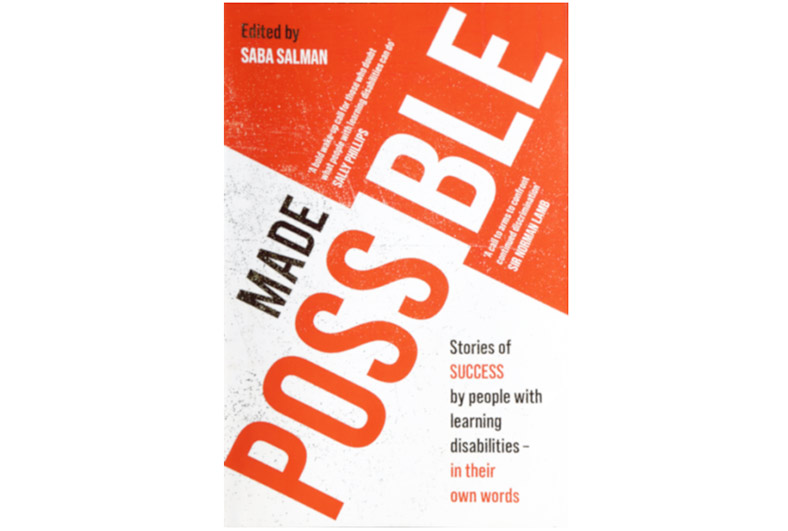Journalist as Author: Saba Salman – Made Possible

‘I know so many incredibly talented, determined people who happen to have a learning disability and I wanted their stories to reach more people.’ Finding the word limit of regular articles too restrictive to fully tell the stories of people too often unheard, journalist Saba Salman decided to create a space for sharing these experiences with her book Made Possible: Stories of success by people with learning disabilities – in their own words.
Regularly writing for The Guardian on issues relating to social affairs, public and third sectors, and welfare and disability issues, Saba aims to inform on the impact long-term austerity continues to have on those with learning disabilities as well as concerns for the long-term effects of lockdown during the COVID-19 crisis.
Can you introduce your book in a couple of sentences?
Made Possible: Stories of success by people with learning disabilities – in their own words blows stereotypes about learning disability out of the water. While it doesn’t shy away from the injustice learning disabled people face, it’s ultimately an uplifting read that proves everyone is human, everyone has potential and that society is poorer for assuming aspiration doesn’t apply to people with learning disabilities.
Could you tell us about how you came to write Made Possible?
Made Possible wouldn’t exist if it wasn’t for my youngest sister Raana, who has the learning disability fragile X syndrome. I was often asked what I wanted to be when I was a child, but Raana never got asked the same question. Society judges us on what we bring to the table, so if it’s assumed that some of us have nothing to contribute then it follows that society regards some of us as less than human. I wanted to challenge that assumption by describing my sister’s potential and personality.
Also, through my social affairs reporting, I know that deadlines and word counts mean that my articles don’t offer people’s stories enough room to breathe. I know so many incredibly talented, determined people who happen to have a learning disability and I wanted their stories to reach more people. The context also makes this a timely book; years of austerity have stripped back support for people like my sister, which undermines their chances of flourishing.
Are you working on another book, or do you have other projects under way?
There is something in the pipeline, loosely linked to Made Possible but I’m also keen to get back to my usual reporting. Learning disabled people are among the groups generally overlooked in the national response to COVID-19, and there’s a real concern about what the long-term impact of lockdown will be in terms of their support.
Can you offer any advice to other journalists thinking about writing a book that collates individual stories like Made Possible?
It’s an all-consuming experience, so time, patience and flexibility are vital. As an editor, collaborating closely with the book’s contributors to get their stories on the page, I also had to mute my own ‘voice’ to make sure each essayist’s voice remained paramount – despite my personal connection to the book’s subject matter.
What books are you reading right now, or about to pick up?
For fiction, I’ve gone back to the sublime Margaret Atwood (Hag-Seed) and for non-fiction Excellent Essex by Gillian Darley, an eye-opening retelling of a county that everyone assumes they know.
Are there any other examples of your everyday journalism that you’re especially proud of or would just like to share?
Generally, I’m really proud of the stories I’ve worked on with family campaigners and learning disabled people themselves to reveal the discrimination they experience and the barriers they face thanks to Government policies. More recently, as the UK was going into lockdown, I felt it was crucial to report the fact that COVID-19 is exacerbating the inequality faced by people like my sister, Raana.
Are you available for freelance commissions, speaker opportunities or other roles?
Absolutely. I enjoyed talking about Made Possible on Radio 4’s Today programme and appeared on BBC Breakfast to give a personal view of the impact of enforced separation on families of learning disabled people.
If I’m a PR professional with a story or another opportunity for you, how should I get in touch?
Email’s best, preferably with clear detail in the subject line so I know it’s relevant to my brief. Also anything addressed to ‘Mr Salman’ or ‘Dear Salman’ winds up in the trash (friendly tip: I know I’ve got an unusual name, but maybe check before assuming I’m a bloke?).
Made Possible: Stories of success by people with learning disabilities – in their own words (28/05/2020, Unbound) is available in paperback here and on Kindle on Amazon. Follow Saba on Twitter @Saba_Salman and read her work at The Guardian here. Find updates featuring the contributors to Made Possible on the book’s Facebook page.